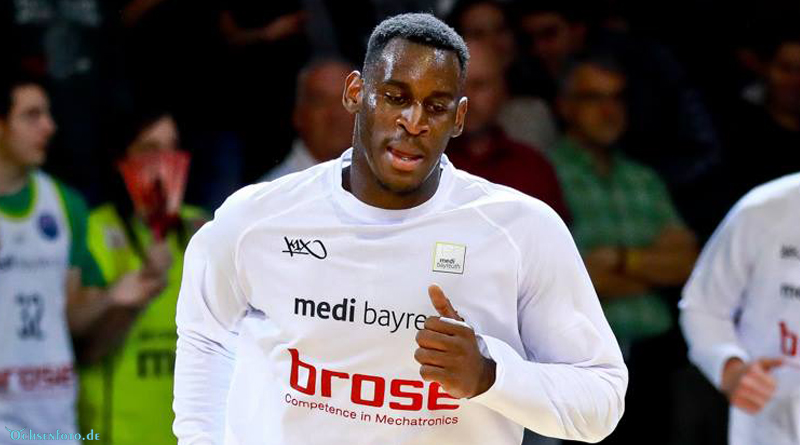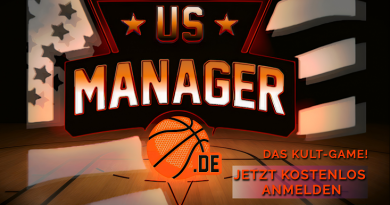Javon McCrea: “Overseas athletes go through many mental health issues we can’t see“
NBA players like Kevin Love, DeMar DeRozan, and Chris Bosh recently talked about their mental health issues. And overseas? “50 to 60 percent of the US players” deal with some sort of mental health issue, says Javon McCrea – including himself. The former Buffalo Bull center opens up about anxiety, pressure and therapeutic help.
“Sometimes you can’t wear your sneakers in stores – you gotta wear their flip-flops.” Javon McCrea has to laugh as he speaks about the different culture in Japan. In his fifth season as a professional athlete McCrea joined the Yokohama B-Corsairs in the Japanese B-League the past offseason. The US center has to adapt to a different lifestyle – while riding a bike in the metropolis because he didn’t get a car. Regarding basketball he’s on the fast lane however: McCrea is averaging 19.8 points, 9.4 rebounds, 1.9 assists, 2.1 steals and 0.9 blocks per game in 28.9 minutes – in a league where “the overweight guys are the ones that can really get big money because it’s so physical”, the 6’7’’ athlete mentions one difference to his past seasons playing in Europe.
As I reach out to Javon McCrea at the end of November on an eight hour long time difference, and ask him how he’s doing he answers, “solid”. Even in the beginning of the conversation I get the feeling that he’s not the typical US-American who uses the common “how you’re doing?” as a mere salutation type of thing. McCrea reflects on the well being. The 26 years old become a father in August and has his family with him in Japan – so he has to deal with a lot of emotions, he says. Especially since McCrea wants to talk about mental health.
[to the German version of the interview]
basketball.de: Was there some kind of tipping point for you to speak up about your mental health issues now?
Javon McCrea: Yeah, especially after what I went through. I don’t wanna have any pity party or anybody to feel sorry for me. But last season was a really down year for me. As far as mentally it was tough: going through so many injuries I went through, and being on some teams but not playing. Then going to the whole Tuebingen situation, where we would be losing a lot of games but I felt like nobody really cared in the organisation that we were losing so much. And the fact that I was playing so well, and for them to release me over something that I didn’t feel like they had any proof that happened and that I would do that really hurt me a lot, too. Also having a kid come on my way. And especially how hard it is to be an American athlete over in Europe – that is not the easiest thing. We’re coming with a lot of talent but it’s still not our home base. Adapting to European coaches sometimes is not as easy as it may seem, sometimes it doesn’t give you the benefit of the doubt. A lot of those things really made me down.

“The pressure performing at a high level every night really got to me sometimes“
There were are a lot NBA players opening up about mental health recently like Kevin Love, DeMar DeRozan and Chris Bosh, before that Royce White. Did that strengthen your stance to open up as well?
Yeah, I’ve seen Kevin Love speaking about it. Some of things he was talking about in the interview, I was feeling as well: as far as anxiety going into the game. Sometimes it’s so much pressure to go out and perform. And the way it goes after you didn’t perform, it’s tough. Sometimes you are not in the position to perform, sometimes it’s not your night, you can’t always expect somebody to go out there and score a lot of points – that’s not how basketball goes. The whole pressure going out there and performing at a high level every night really got to me sometimes. That wouldn’t let me go to sleep.
You touched anxiety issues. Are there any other mental health issues you deal with?
The thing I deal with the most is the anxiety to go perform, obviously. And another thing is injuries: I went through two bad injuries my first year in Germany. I got a mosquito bite, it got infected, I was out for about a month in the beginning of the year. And then the second one was when one of my team mates ran into my knee, I tore my meniscus a little bit. It really got to the point where at the end of the year in March I would get injured because I was thinking about it so much, every season in March I would get injured. And when it got time when March came I just felt like some bad thing would happen – every game. It really got to me. It would really affect me: my sleep, how I would go into the game, my mood – my coaches and my team mates would always say, “why are you so moody? What’s going on with you?” Being injured and not performing are the two of the biggest things that hurt my mental health.
Did these issues come up during your professional career? Or did you notice having mental health issues already during your college career?
Looking back it started to come up a little bit in college. But once I got hurt the second time in Germany, that’s when things really started taking a turn and really started going downhill. I went to France my next year, I performed well in France, and I still wouldn’t play as many minutes as I should have. I would like have 20 points going into the fourth quarter, and I wouldn’t play the fourth. And we were losing. That would hurt my mental health as well. Because you gotta realise basketball is a business, politics are always gonna win. If politics are not on your side, it’s just not on your side. Once I realised that the game I love was not always build on how well I play – that was tough because I felt like I couldn’t win.
Did or do you seek professional help for your anxiety issues?
This is the first season I actually realised I had a mental issue. So, this year in Japan I’m actually seeing a therapist right now, I was talking with my therapist yesterday. He really helps me with my mental issues: he’s someone I can just go and talk to and let everything out. That really helps me a lot. It really helps me to get over some of the things I got over and tell him one of the things I went through in my life growing up. He said it steers from there, with having an ADHD problem: you keep staying by the same bad things and you keep repeating the stuff in your head no matter what happens. He helped me a lot with caring some of that stuff, seeking a lot of things and taking the right meds in order to be mentally fit.

“I talk to my therapist every two weeks“
Did you go to your therapist by your own, or did you get any help from your team like they were saying we have someone we know?
It was my coach actually. My coach – Tom Wisman, a really respected coach in Japan – has a son who has mental issues. Right when he saw me the first week, he knew I had a mental issue. One of his friends is a therapist. I talk to my therapist every two weeks.
Do you have the feeling that you’re making progress?
Yes, I’m actually making good progress, my performance is going up. I feel a lot better knowing that it’s not only me. It’s just not me being the weird guy in the world. A lot of people are going through what I’m going through. That helps me a lot mentally. And just knowing that somebody has my back. When I talk to my therapist, he always nurtures me and makes sure that I know that some things are okay and some things we gotta work on.
With those anxiety issues on the field did your therapist gave you like some kind of psychological advices or practical methods you can do to put these anxiety issues out of the way?
Practically, he says meditate. Meditation is the best. Just sit down, calm yourself down, take deep breaths and understand it’s not as serious as you think. I’m trying to relax my mind. And I go out there and just try to give my best effort. He also gave me another good advice: Not in Germany, but I’ve been forced to play through a lot of my injuries in my career. And he said: “if they gonna judge you anyway, just say, ,I’m hurting, I’m not playing’”. I’ve done that this season, got the rest I needed, came back and had my career-high [of 32 points]. Some of his philosophies really do work.

“I’ve been called a ’sissy‘ plenty of times because I wouldn’t want to play through an injury”
So, your coach in Japan sympathizes with you. But if you go back to your pro career, do you have the feeling you could have done that during your career with other coaches? Saying you can’t play because you’re injured or opening up about your mental health issues.
It’s tough overseas. In Germany if you’re hurt, they wanna help, they won’t let you play through any injuries. That’s one thing that is good about Deutschland. But places like Israel or anywhere else … it’s tough, man, it’s tough. They probably gonna make you feel bad. I’ve been called a “sissy” plenty of times, or that I’m soft. Because I wouldn’t want to play through an injury. But in places like Germany that never applied.
There was a five-part series on ESPN by Jackie MacMullan on the mental health topic. In one of the articles John Lucas, a former NBA player and now assistant coach with the Houston Rckets, said that he thinks 40 percent if not more NBA players have some sort of mental health issue. Do you think that applies to overseas athletes as well?
That’s what I notice, too, that a lot of my team mates were going through the same things if not worse than me, just not admitting it to themselves. Or not really understanding what they are going through. I think the percentage is higher. In the NBA you reached your goals, you gotten to where you wanna get to. Overseas? Most of the players overseas never have been in the NBA. I think the mental health issue is a lot higher. I would say, 50 to 60 percent. Especially with the people I’ve been around: guys that don’t wanna leave the house, guys that are just moping around, guys that are really sad and really negative about a lot of things. Going to sign autographs? They don’t wanna sign autographs. Going out to dinner? They don’t wanna go out to dinner. They just wanna sit home and be miserable a lot of the time. I think overseas, athletes go through many mental health issues we can’t see.
What are the reasons for that? Being away from home? And don’t have contracts many players have in the NBA with a long-term security?
Exactly. In the NBA you get a four, five year deal, and how many have a million? You’re pretty good. Overseas, it’s a couple of hundred thousands, and for one season. You don’t know what you’re going to do next season. And after one or two bad games, you think all hell is breaking loose. I think overseas it affects you with the stability of the contracts: people signing one year deals, and you don’t know where you gonna be at. Your family doesn’t wanna come see you some of the times, then you’re just alone most of the times, looking at the wall.

“A lot of people don’t want to admit it. They feel like it’s a sign of weakness, that it’s not ‘masculine’“
With estimating that 50 to 60 percent of players overseas deal with mental health issues: Have you talked to team mates about that?
I talked to a few of my team mates and friends about it. They would always deny it quick. A lot of people don’t want to admit it. They feel like it’s a sign of defeat or weakness, that it’s not ‘masculine’. The negativity that I hear from a lot of guys makes me feel they’re going through the same things I’m going trough. And I know I’m not the only one.
With the NBA we talk about one of if not the greatest pro sports league in the world. There are a lot of opportunities, thus financially as well. But how hard is for a player overseas to seek help and find a support system?
Yeah, it’s definitely financially tough especially with the budget. Everybody doesn’t have a big budget like Bayern Munich or ALBA BERLIN. It’s tough for a lot of these teams to get that help. But I think it would help a lot of these teams to have a mental counsellor. I went through a lof of the LeBron James interviews on Interrupted – and a lot of the NBA players have psychiatrists or like a sport counsellor they can talk to, to get some of the voices out of their heads. Because before a game, it can be some voice in your head that’s telling you what’s gonna go wrong. And it’s best to go into a basketball game blank minded, free of will and just understanding being confident and going out there playing your game. But I know a lot of people that are struggling having those voices in their head.
In the NBA there will be a “Director of Mental Health and Wellness“ in the future. With the rookie transition program, players starting their pro career are being supported. I was asking myself if such a transition program for US players going overseas would be an important thing.
There’s no transition program. In some sense, they really tell you what not to do after you already messed up. (laughs) There’s not really a thing like preventative measures. It’s almost like a slap on your wrist after you messed up. I know I’ve done things as far as going out in the wrong time, being around the wrong people, responding to my coaches and staff when they try to get on me the wrong way. And it’s not really too many people telling you how to live over there. You gotta do it almost on your own. So, it’s tough when you get into one of these situations, you can almost feel like people picking on you, people are treating you the wrong way.
“I didn’t know if I wanted to play basketball any more at that point“
Do you have the feeling that these anxieties issues did prevent you from signing with certain teams and getting contracts in the past?
It was a hurdle for me when I played in France, I went home in November. I decided to leave the team because I was mentally so out of it. The team wanted me to stay – I just wanted to go home. And I sat home for two or three months, and it really ruined my career a little bit. I was so home sick, I didn’t wanna play overseas. I really didn’t know if I wanted to play basketball any more at that point. And that’s when I went to Puerto Rico which wasn’t the best decision. I had offers from teams in Greece and Israel among others. But I just decided not to go. Had I been more secure of myself and had I know back then that I have anxiety and depression, I think I’d have made the decision to go play back over there, make a lot of money or play in Eurocup. But I decided not to … because I wanted to stay home and do nothing.
As I mentioned there have been a lot of NBA players speaking up. But from overseas athletes I haven’t heard of any. Have you?
That’s the thing, it’s tough. I really haven’t heard from too many players overseas talk about mental illness because they don’t want to seem so weak. If you say you’re mental sick, it may turn you away from a lot of jobs. A lot of people might say, “we don’t wanna mess with him”. I don’t think it’s really accepted. I think it would be more accepted if people would understand it’s okay to be mentally sick; I think a lot more guys would speak up.

“I’m putting myself on the line“
Now you speak up. What do you think comes next: Do you feel that maybe it could hurt you with future contracts? Or do you think maybe other players overseas could follow?
I’m putting myself on the line. I understand it’s a job, and it’s money that needs to be made out here. But at the end of the day, your mental well being is the most important. If somebody is mentally sick, you don’t wanna make somebody making the wrong decisions, drinking their life away, doing drugs or have somebody go out there committing suicide. That’s something that can really happen.
At the end of the day, if people can understand that you can have somebody mentally sick on your team, the performance of the players can go up – it can help both sides. I wanna put myself on the line to make sure it’s okay for players to know that they can be open about it. I was open about it to my coach, and he helped me. I feel a lot better. It’ll may help some other guys, even if it’s two or three people or 30 people, as long as it helps somebody out that’s okay with me.
What are your plans for future? Could you imagine staying in Japan? Would you rather go back to Europe?
That’s another thing that my therapist has been me helping with: as far as staying in the moment. It was easy for me to look a year ahead. Now, looking a year ahead will stress me out. Once, because I know there so much more for me to do, and I want to take it one day by day, game by game. I don’t mind where I play at as long as my family and I are in the best situation, a situation where I can be mentally happy. I would love to play in Germany, Asia is a great market, I would even love to play in America. Right now, it’s tough for me to figure that thing out. I wanna play wherever I’m happy.
If you want to follow Javon McCrea you can do that via social media – on Instagram, Facebook, Twitter and YouTube – or his website JavonMcCrea.com



